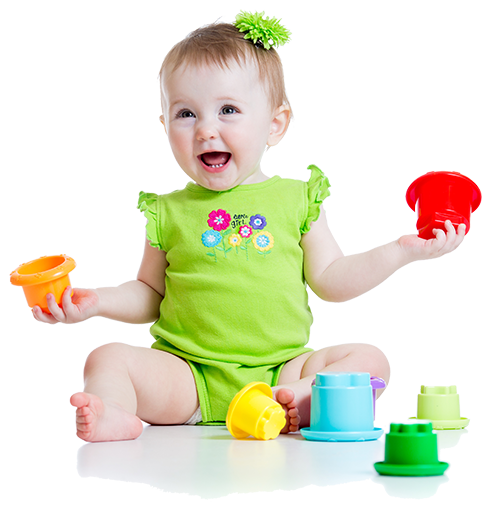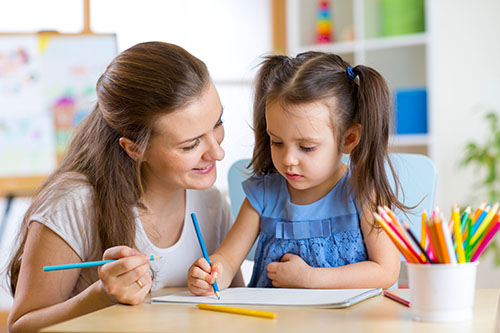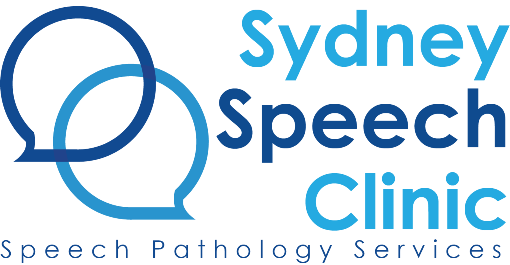Many parents wonder if their child’s speech and language skills are developing normally. While children develop at different rates, there is a general pattern in speech and language development.
 By 12 months most typically developing babies will be able to:
By 12 months most typically developing babies will be able to:
- respond to familiar sounds, such as the telephone ringing, the vacuum cleaner, or the car outside
- understand simple commands e.g. ‘no touching’
- recognise their own name
- understand the names of familiar objects or people
- say ‘dada’, ‘mama’ and a few other words
- enjoy songs, music and books
- try to make familiar sounds, such as car and animal noises
By 18 months most typically developing toddlers will be able to:
- use approximately 10-20 words mainly nouns such as ‘teddy’ ‘milk’ ‘bath’
- imitate daily activities through play e.g. washing up, making tea, sweeping floor
- point to some body parts when named, such as tummy or eyes
- understand simple sentences, such as ‘where are your shoes?’
- carry out simple instructions such as ‘bring mummy the keys’
- may use the same word for lots of different things e.g. ‘dog’ for all four-legged animals
By the age of 2 most typically developing toddlers will be able to:
- use more than 50 words such as ‘no’, ‘gone’, ‘mine’, ‘teddy’
- join 2 or 3 words to make simple sentences such as ‘milk all gone’
- say the names of simple body parts, such as nose and tummy
- listen to stories and say the names of pictures
- talk to themselves or their toys during play
- sing simple songs, such as ‘Twinkle, twinkle, little star’ or ‘Baa baa black sheep’
- use pronouns instead of names, such as ‘he’ or ‘it’
By the age of 3 most typically developing children will be able to:
- use 3 to 4 word sentences with a vocabulary of approximately 900 words
- use basic grammar and a range of word types including nouns (people, places, objects), verbs (actions), pronouns (e.g. he, she, it) and adjectives (describing words)
- enjoy telling stories and asking questions
- begin to predict and show a broader understanding of cause and effect: that hot things burn and sharp things cut
- assign roles in pretend social play, for example ‘you be the daddy’
- be understood by familiar adults
By age 3 years most children can produce the following sounds correctly h y w ng m n p b k g t d
 By the age of 4 most typically developing children will be able to:
By the age of 4 most typically developing children will be able to:
- use a large vocabulary (over 1500 words) with mostly correct grammar and intelligible speech
- say own name and age and sometimes address
- use variety of questions ‘Why?’, ‘When?’, ‘How’? and answer ‘Who?’, ‘Whose?’, ‘Why?’, and ‘How many?’
- enjoy jokes, visual and verbal nonsense/humour
- understand the sequence of daily events and have some sense of past and present, as in ‘yesterday’, ‘tomorrow’, ‘the olden days’
- name colours and some shapes and match them and count by rote
- recount a recent experience, but sometimes confuses fact and fantasy
- understand questions such as ‘What do you think will happen next?’ ‘What will happen if?’ and predict possible outcomes
- use and show understanding of positional words, for example, ‘behind’, ‘beside’, ‘next to’, ‘in front of’, ‘under’, ‘over’
- recognise own first name in print and try to write or copy it
By age 4 years most children can also say f l sh ch sounds correctly
By the age of 5 most typically developing children will be able to:
- understand opposites, such as high and low, wet and dry, big and little
- use sentences of about 7 words with correct grammar
- talk about events which are happening, have happened or might happen
- explain why something happens, such as ‘mum’s car stopped because the petrol ran out’
- explain the function of objects, for example, ‘this stapler keeps the pages together’
- follow complex directions, for example, ‘stand up, get your shoes on and wait by the door’
- say how they feel and tell you their ideas
- match speech to situations, for example, ‘baby talk’ for younger siblings, ‘proper talk’ for teachers, ‘playground talk’ with friends
- become more interested in writing, numbers and reading things
- count and touch a set of corresponding objects correctly
- speak clearly enough to be understood by anyone
Most 5 year olds can say the s z j r sounds correctly, v should be correct by age 6 and th should be correct by around 8 years.
Language Development Milestones from 6 years+
- makes few grammatical errors while speaking
- uses and understands prepositions (in, out, over, under, etc.) and personal pronouns (I, me, myself, etc.) correctly
- understands analogies
- begins to experiment with tongue twisters
- communicates effectively in social settings (school, playground, and classroom)
- knows similarities and opposites
- able to communicate efficiently with peers and adults
- understands and uses more complex grammar
- understands rules and expectations for social behaviour within the classroom
- enjoys riddles and telling jokes
During this stage, school age children have an increased awareness of vocabulary and words which they continue to extend as they learn new words. Conversations are a lot more detailed and can be sustained for a longer period of time. School age children will seek meaning and use of new words daily especially as they learn to read.
When to seek help?
If you are concerned at all about your child’s speech or language development then consider contacting a speech pathologist. Research supports that children who receive early intervention have better outcomes than children who commence services when they are older.
The right time to seek help is when you, as a parent, are concerned.
